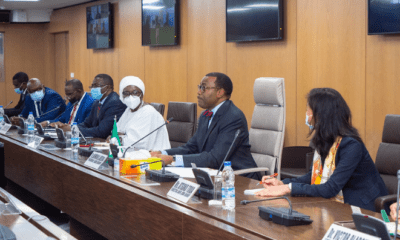AFP Supports Access to Renewable Energy with €70m
The Agence Francaise de Developpement (AFD) is supporting access to renewable energy for Nigerian manufacturers with €70 million under the Sustainable Use of Natural Resources and Energy Finance (SUNREF) Nigeria Programme for renewable energy.
The fund would be administered through the Access Bank Plc and the United Bank for Africa Plc.
However, only renewable energy projects like solar, wind, small hydro, biomas including waste-to-energy power plants would be eligible for funding under the SUNREF initiative.
The AFP described energy efficiency projects (EEP) as capital expenditure projects that would allow energy consumers to use less energy for achieving the same level of energy service.
The AFP made this known during the Renewable Energy and Energy Efficiency investors’ virtual conference that was held on Wednesday, in partnership with the Nigerian Energy Support Programme (NESP), which is a technical assistance programme co-funded by the European Union (EU) and the German Government and implemented by Deutsche Gesellschaft für Internationale Zusammenarbeit (GIZ) GmbH in collaboration with the Federal Ministry of Power and All-On of the Shell Foundation.
The conference was aimed at enabling the Renewable Energy Association of Nigeria (REAN) to understand the SUNREF’s technical requirements, equipment and installation quality standards, self-regulatory initiatives and certification for industry practitioners.
The President of the Nigerian Manufacturers Association (MAN), Mr. Mansur Ahmed, who participated in the conference, described the financial and technical assistance offered by the SUNREF as significant opportunity that came at a time, “we needed it most more than ever” to address one of the most militating factors against industrial development of Nigeria.
Mansur said: “Clearly, this is the time for every effort to shore up the manufacturing sector is very welcomed. Therefore, I am delighted that this green energy project is focusing on renewable energy in improving energy efficiency.
“It is our hope that our members will take the full advantage of this facility and be able to diversify their energy sources, improve energy consumption and be able to expand their productive capacity, which is indeed very important in the current state of our economy. I, therefore, urge our members to take full advantage of this.”
The Country Director of the AFP, Ms. Virginie Diaz, said in her opening remark during the conference that the SUNREF would basically provide financial and technical assistance “aimed at supporting business strategies in the green energy sector in line with the Paris Agreement on Climate Change, which Nigeria has been supportive of.”
Also, the Head of Cooperation of the EU Delegation to Nigeria and the ECOWAS, Ms. Cecile Tassin-Pelzer, said the conference would enable investors and service providers to showcase their products and be able to develop relationships with clients and prospective investors in Nigeria.
She added: “I will like to highlight that this collaboration is an innovative financing and project that will help to address Nigeria’s energy gaps by mobilising foreign investments to finance green power projects.”
The SUNREF Nigeria Team Lead, Mr. Javier Betancourt, described SUNREF as integrated environmental finance that is dedicated to developing renewable energy in Nigeria.
Betancourt said in his presentation during the conference that the AFD has put in place targeted support to develop innovative green financing through dedicated credit lines through local financial institutions in the country.
He said: “The SUNREF is part of the broader initiative to promote energy efficiency and renewable energy as well as the sustainable use of natural resources.”
According to the Chief Executive Officer of All On, Dr. Wiebe Boer, the mission of the SUNREF is to bring the members of the MAN into the green energy fold.
Boer observed that any opportunity to address the significant gap that exists in access to energy in Nigeria would have considerable economic and social impacts.


 Naira4 weeks ago
Naira4 weeks ago
 Billionaire Watch4 weeks ago
Billionaire Watch4 weeks ago



 Naira4 weeks ago
Naira4 weeks ago






 Naira4 weeks ago
Naira4 weeks ago


 Naira3 weeks ago
Naira3 weeks ago






 Naira3 weeks ago
Naira3 weeks ago
 Economy4 weeks ago
Economy4 weeks ago


 Naira3 weeks ago
Naira3 weeks ago

















